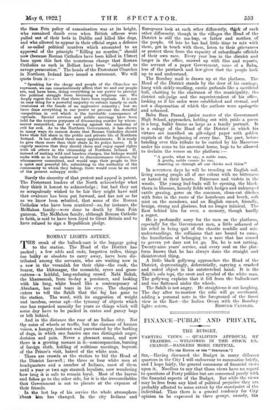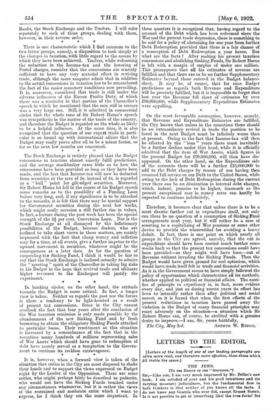F1NANCE—PUBLIC AND PRIVATE.
THE BUDGET.
VARYING VIEWS. — QUALIFIED APPROVAL BY TRADERS. — WELCOMED IN THE STOCK EX- CHANGE.—BANKERS MORE CRITICAL.
iTo TEX EDITOR or TES " SPWLITOR,"] SIR,—Having discussed the Budget in many different, quarters in the City I will endeavour to summarize briefly, and I hope fairly, the general consensus of financial views upon it. Needless to say that those views have no regard to questions of Party politics but are concerned purely with the financial aspects of the Budget. But while the views may be free from any kind of political prejudice they are probably affected to some extent by the standpoint of the individual. Thus there is a general tendency for City opinion to be expressed in three groups, namely, the Banks; the Stock Exchange and the Traders. I will refer separately to each of these groups, dealing with them, however,, in their reverse order.
There is one characteristic. which I find. common to the two latter groups, namely; a disposition• to look simply at the changes in taxation,with little regard to the. means by which they have been achieved. Traders, while welcoming the reduction in the Income-tax and the lowering of Postal charges, consider that the concessions are scarcely sufficient to have any very material effect in reviving trade, although the more sanguine admit that in addition to the actual concessions in taxation has to be remembered the fact of the easier monetary conditions now prevailing. It is, moreover, considered that trade is still under the adverse influences of the Excess Profits Duty, of which there was a reminder in that portion of the Chancellor's speech in which he mentioned that the sum still in arrears was a very large one. Still, it is admitted in commercial circles that the whole tone of Sir- Robert Home's speech was sympathetic in the matter of the trade of the country, and therefore the Budget is regarded on the whole as likely to be a helpful influence. At the same time, it is also recognized that the question of our expert trade in parti- cular is so bound up with international affairs that the Budget may easily prove after all to be a minor factor, so far as the next few months are concerned. * * The Stock Exchange is entirely pleased that the. Budget concessions in taxation almost exactly fulfil predictions, and the average stockbroker cares little as to how the concessions have been provided so long as they have been made, and the fact that Income-tax will now be deducted from securities at the rate of 5s. instead of 6s. is regarded as a " bull " point for gilt-edged securities. Moreover, Sir Robert Home let fall in the course of his Budget speech some remarks as to the possibility of a Funding Loan before very long, and, if any significance into be attached to the remarks, it is felt that there may be special support for Government securities during the next few weeks, which might easily occasion a still further rise in values. In fact, a feature during the past week has been the special strength of the 3 per cent. Conversion Loan. Nor is the Stock Exchange at all dismayed by the inflationary possibilities of the Budget, because dealers, who are inclined to take short views in these matters, are mainly impressed with the fact that cheap money and inflation may for a time, at all events, give a further impetus to the upward movement in securities, whatever might be the consequences at a later date. As for the question of suspending the Sinking Fund, I th;nk it would be fair to say that the Stock Exchange is inclined actually to admire the " sporting " spirit of the Chancellor in taking big risks in his Budget in the hope that revived trade and ultimata higher revenues to the Exchequer will justify the experiment. * * * In banking circles, on the other hand,. the attitude towards the Budget is more critical. In fact, a longer view is taken. Neither as regards the past nor the future is there a tendency to be light-hearted as a result of present tax concessions. Some in the City cannot overlook the fact that four years after the conclusion of the War taxation remission is only- made possible by the abandonment of the new Sinking Fund and. by fresh borrowing to obtain the obligatory- Sinking' Funds attached to particular loans. Their resentment at this situation is increased by a remembrance of the fact that in the meantime many hundreds of millions representing. sales of War Assets which should have gone to redemption of debt have merely served as a temptation to the Govern- ment to continue its reckless. extravagance.
* *
It is, however, when a forward view is taken of' the, situation that critics in the City are most disposed- to shake their heads and to support the views expressed on Budget night by the Leader of the Opposition. There are some critics, who might perhaps fairly be described ha- pedantic, who would not have the Sinking Funds touched under any circumstances whatsoever, but it. is rather the views of the restrained and moderate critic which I want to express, for I think they, are the more important. In these quarters it is recognized that, having: regard to the amount of the Debt which, has- been redeemed since the War and the present trade dopresaion,,there is something, to be said for a policy of abstaining for one. year from further Debt Redemption provided that there is a fair chance of a resumption of Debt Redemption a year hence. But what are the facts 't After making his present taxation concessions and abolishing Sinking Funds, Sir Robert Home is. left with a margin, of surplus of under one million: This presupposes that all his estimates of revenue are fulfilled and that there are to be no. further Supplementary Estimates beyond those entered in the Budget, balance' sheet. It may be, of course,, that for once Budget predictions as regards both Revenue and. Expenditure will be precisely fulfilled, but it is impossible to forget that last year the Revenue fell short of estimates by over £90,000,000, while Supplementary Expenditure Estimates were appalling.
On the most favourable assumption, however, namely, that Revenue and Expenditure Estimates are fulfilled, the City knows that unless in the meantime there should be an extraordinary revival in trade the position to- be faced in the next Budget must be infinitely worse than at present. Owing to the fact that Income-tax will then be affected by the "lean " years there must inevitably be a fiuther decline. under that head, while it is officially admitted that the item of War Assets, which figures in the present Budget for £90,000,000, will then have, dis- appeared. On the other hand, on the. Expenditure side of the accounts there will. be a further L25,000,006. to add to the Debt charges by reason of our having, then resumed full service on our Debt to the United States, while owing to the lack of Debt Redemption during the current year there can be no diminution in internal debt charges, which, indeed, promise to be higher, inasmuch as the present exceptional ease in money rates can hardly be expected to continue indefinitely.
*- Therefore; it becomes clear that unlbss there is to be a most drastic further cut in expenditure itself, not' only can there be no question of a resumption of Sinkingrinid arrangements next year, but it will rather be a case of resorting to a capitalizing of War pensions nr some other device to provide the wherewithal for avoiding a heavy deficit. In fact, there is one point on which nearly all groups in the City are agreed, namely, that the cut in expenditure should have been carried much further some weeks back so• that the present tax concessions could have been provided: as- they might well have been—out of Revenue without. invading the Sinking Funds. Then the Budget would have given ground for real optimism, which would have made itself felt in. trade and. financial-activities. Als it is, the Government'• seems to have simply followed the policy of, opportunism which characterizes all its methods, whether applied to political or financial affairs. The sacri- fice of principle to expediency is, in fact, more evident every day, and just as during recent years its effect has been to intensify rather than- allay political and social unrest, so it is feared that when the first effecte of the present reductions in taxation- have passed' away the violation in the Budget of many financial principles may react adversely on the situatioin—a situation which Sir Robert Home can, of course, be credited with a genuine desire to improve.—I am, Sir, yours. faithfully,



































 Previous page
Previous page